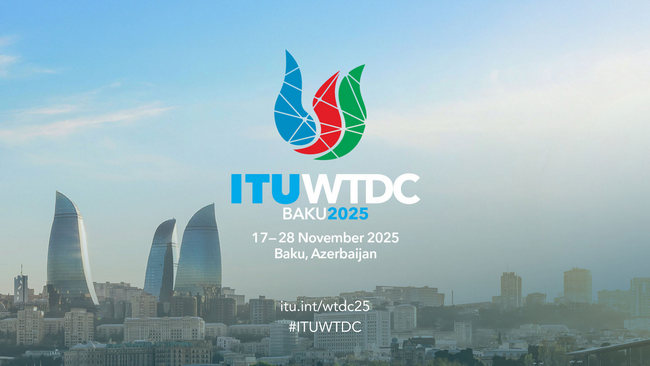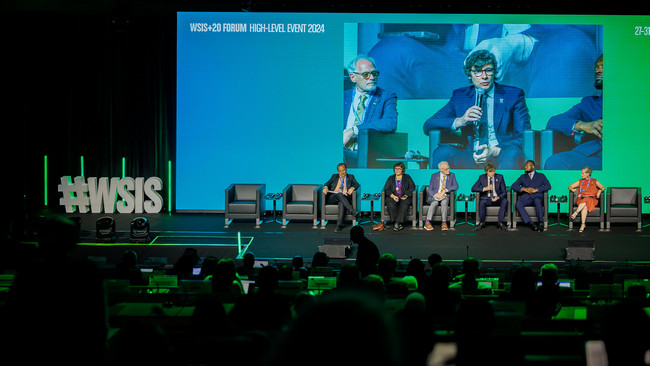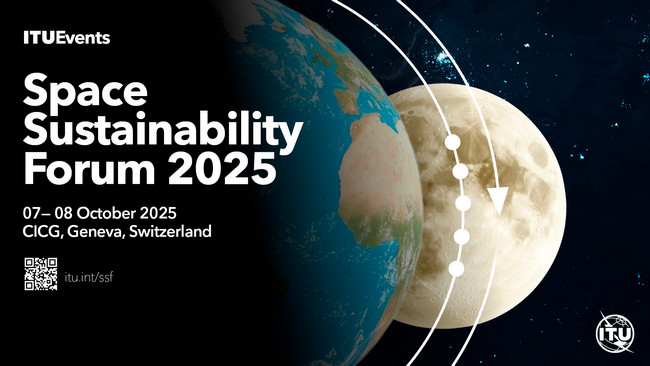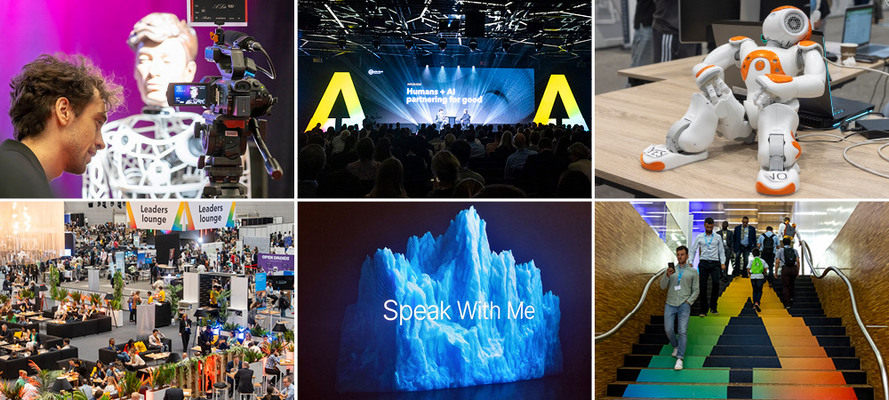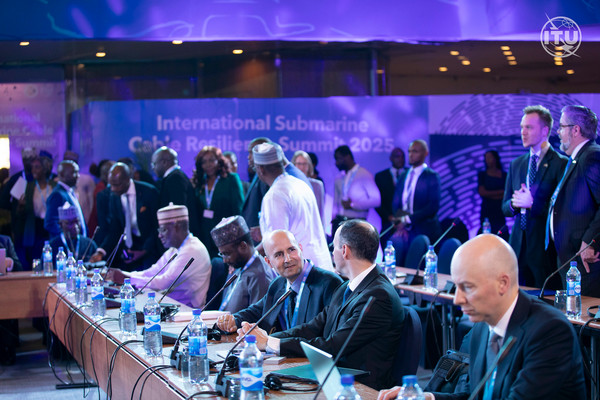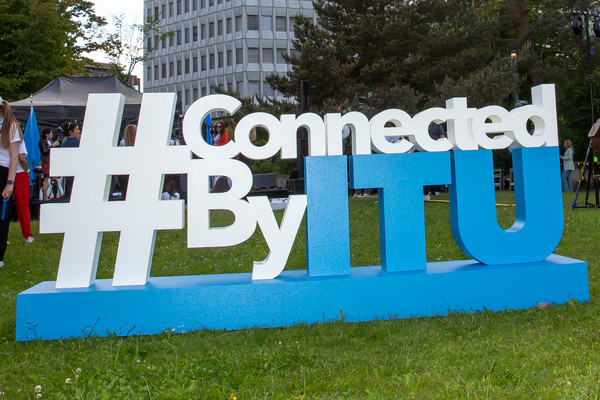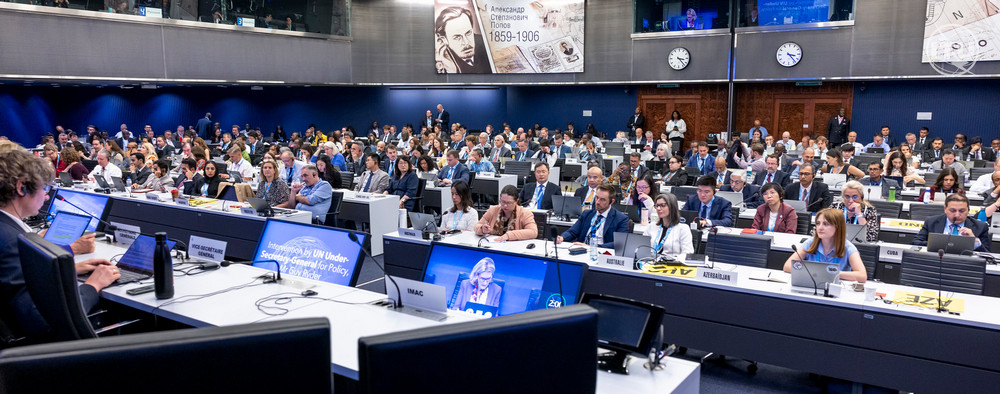
ITU Council 2025
snapshot report
Geneva, Switzerland, 17–27 June
The 2025 session of the Council of the International Telecommunication Union (ITU) discussed global opportunities and challenges in space, artificial intelligence (AI), digital development cooperation, and more.
The annual governing body approved ITU’s latest annual activity report, confirmed operational plans up to 2029, approved the next biennial budget for 2026-2027, noted expert findings on key issues, and exchanged updates on the organization’s forthcoming development, plenipotentiary, and radiocommunication conferences – WTDC-25, PP-26, and WRC-27.
The Council, composed of 48 Member States, acts as ITU’s governing body in the four-year cycle between plenipotentiary conferences.
“Let’s become a fit-for-future union that delivers for our members, for all people and our planet, for the next 160 years and beyond.”
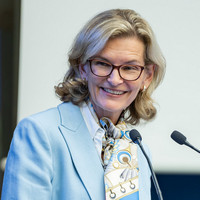 Doreen Bogdan-Martin, ITU Secretary-General
Doreen Bogdan-Martin, ITU Secretary-General
Key outcomes
State of the Union address by ITU Secretary-General
Marking ITU’s 160th anniversary, Secretary-General Doreen Bogdan-Martin reminded the 2025 session of ITU Council that two-thirds of humanity is now online — yet 2.6 billion people remain unconnected.
In her State of the Union address, she laid out how ITU is leading the global digital agenda, with key initiatives featured at recent meetings of the G20 and World Economic Forum, and shared progress on ITU’s flagship initiatives including Partner2Connect, which has mobilized more than USD 73 billion in pledges to date, and Giga, whose newly inaugurated Connectivity Center aims to accelerate school connectivity in 41 countries.
Doreen Bogdan-Martin also highlighted advances in ITU’s technical work, from radiocommunication studies leading up to the next World Radiocommunication Conference (WRC-27), to technical standards for emerging technologies including AI, to development efforts to build digital capacity in 140 countries and up-skilling 150 000 people over the past year.
Finally, the Secretary-General updated Councillors on ITU’s progress in becoming “fit-for-future” through its transformation roadmap. Together, she concluded, these efforts seek to turn 160 years of multilateral technical cooperation into meaningful digital opportunities for everyone, everywhere.
Annual Report 2025
The Council approved ITU’s latest annual report, which outlines activities undertaken and results achieved during 2024 as part of implementing the ITU strategic plan for 2024-2027.
Digital development leaving no one behind: WTDC-25
The Council noted ongoing preparations for the World Telecommunication Development Conference (WTDC-25), set to take place from 17 to 28 November 2025 in Baku, Republic of Azerbaijan, with a focus on “Universal, meaningful and affordable connectivity for an inclusive and sustainable digital future.”
“The conference will serve as a vital platform to shape the future of global telecommunication development and advance our shared digital goals,” said Sameddin Asadov, Azerbaijan’s Deputy Minister of Digital Development and Transport.
WTDC-25 will be preceded by a Youth Celebration Day on 16 November, a tribute to the energy and innovation of the next generation.
Check out other ITU Council snapshot reports.
WSIS+20 report and review
The multi-stakeholder process derives from the World Summit on the Information Society (WSIS) remains a key mechanism for international cooperation on connectivity, digital development and wider human development challenges.
Councillors welcomed ITU’s WSIS+20 report, underlined the need for continued engagement to meet the objectives of the Global Digital Compact (recently adopted with the UN Pact for the Future), and agreed that the WSIS process should continue beyond 2025.
The report serves as ITU’s contribution to the WSIS+20 overall by the UN General Assembly in December 2025. All submissions received through open consultations with ITU Member States will also be forwarded to the UN General Assembly.
Advancing the Space 2030 Agenda
ITU helped shaped and continues advancing the UN Space2030 Agenda, which envisages outer space operations as a driver of sustainable development for humanity. The Council noted the ITU Secretary General’s implementation report, which cited key recent and upcoming activities related to radiocommunications in space.
ITU’s successful first Space Sustainability Forum (10-11 September 2024) will be followed the second edition (7-8 October 2025) that further steps up cooperation among governments, the space industry, UN agencies and other stakeholders to keep this vital resource viable for future generations.
ITU’s Space Connect webinar series (begun 30 January 2025) explores regulatory, investment and operational challenges across the rapidly evolving sector. A new web portal, the Space Sustainability Gateway, highlights ITU’s wide-ranging work to ensure sustainable space communications.
Optimizing AI
The Council noted a report by the Secretary-General following up on ITU Plenipotentiary Conference Resolution 214 (Bucharest, 2022) that set out organizational activities and priorities across the rapidly growing field of artificial intelligence (AI) to meet increasing interest among members and other stakeholders.
The AI for Good platform, led by ITU and supported by over 50 UN partners, identifies innovative AI solutions and advances partnerships to solve global challenges. It supports global dialogue on governance, helps build skills, and promotes collaboration on standards. To date, ITU has published over 150 standards for AI, with a similar number currently under development.
The Council called for further expanding AI activities, increasing AI capacity building, and helping the world’s least developed countries devise effective AI policies and strategies.
Bringing the Global Digital Compact to life
ITU provided updates on its action plan and outlined ongoing activities, including a leading role in the UN Working Group on Digital Technologies, to support the implementation of the Global Digital Compact (GDC). The Council reiterated the importance of ITU’s active and sustained engagement in the GDC process, ensuring close alignment with the WSIS+20 Overall Review at the UN General Assembly.
The Compact, adopted by the UN General Assembly in September 2024 as an Annex to the Pact for the Future, sets out key objectives for global digital cooperation. As the UN’s specialized agency for information and communication technologies, ITU is committed to advancing inclusive, secure, and sustainable digital transformation through international collaboration, innovation, and inclusive digital development. With digital transformation now a central theme across the UN system, ITU continues to play a leading role both within and beyond the UN in shaping a digital future that benefits people, planet and prosperity worldwide.
Biennial ITU budget for 2026-2027
The Council reviewed the draft biennial budget for 2026-2027 (Document C25/47), with Councillors calling for clearer, more detailed budget documentation to support informed decision-making.
Questions had been asked on staff costs and alignment with operational plans, assumptions on the World Radiocommunication Conference in 2027, and cost recovery from satellite network filings. A revised draft resolution was introduced, reflecting an increase in satellite network filing revenues to CHF 14.5 million annually, with CHF 500,000 annually earmarked for Radiocommunication Bureau (BR) software.
Concerns were voiced over the impact of global funding reductions on ITU Sectors, reserve levels, and allocations for diversity and inclusion. The Deputy Secretary-General stressed the collaborative process behind the budget and ITU’s ongoing commitment to financial prudence. The draft budget was approved by Council.
The Bahamas hosting WTPF-26
The next World Telecommunication/ICT Policy Forum (WTPF-26), scheduled for 9-11 June 2026, will be held in the Bahamas, preceded by a Strategic Dialogue on 8 June 2026.
WTPF is a high-level, multistakeholder platform, fostering open and inclusive dialogue on emerging and pressing issues in the telecommunication and information and communication technology (ICT) landscape. WTPF aims to build consensus through the Secretary General’s report and the adoption of Opinions that reflect shared priorities, challenges, and opportunities among ITU Member States, Sector Members, and other stakeholders.
WTPF-26, dedicated to “Accelerating an inclusive, sustainable, resilient and innovative digital future,” will address topics such as bridging digital divides, greening digital technologies, enhancing resilience, space connectivity, and strengthening ICT-centric ecosystems and entrepreneurship.
Qatar set to welcome ITU for PP-26
The Council was informed of the steady progress being made in Qatar’s preparations to host ITU’s next Plenipotentiary Conference (PP-26) in the Doha Exhibition & Convention Center towards the end of 2026. With the host-country agreement close to final, both ITU and Qatar are continuing to advance their joint efforts to ensure the successful organization of the conference, implementing the improvements as instructed the previous year by Council-24. The current Council-25 also re-endorsed the guidelines on “ethical aspects of certain campaign activities” in the run-up to the elections that will take place at PP-26.
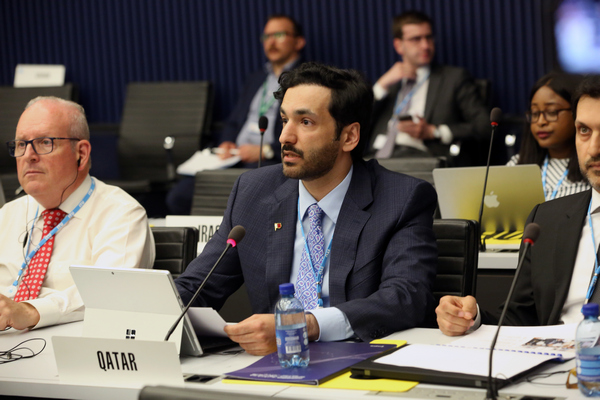
Strengthening ITU’s regional presence
The Council had the opportunity to consider a report about how ITU could enhance its regional presence, improve cross-regional coordination and strengthen collaboration among its three sectors to drive more cohesive and effective outreach and engagement worldwide. After reviewing the status, Council approved terms of reference to guide the ongoing review of regional presence.
“Let us work together to ensure that ITU continues to lead in building an inclusive, secure and innovative-driven digital world for the benefit of citizens all around the world.”
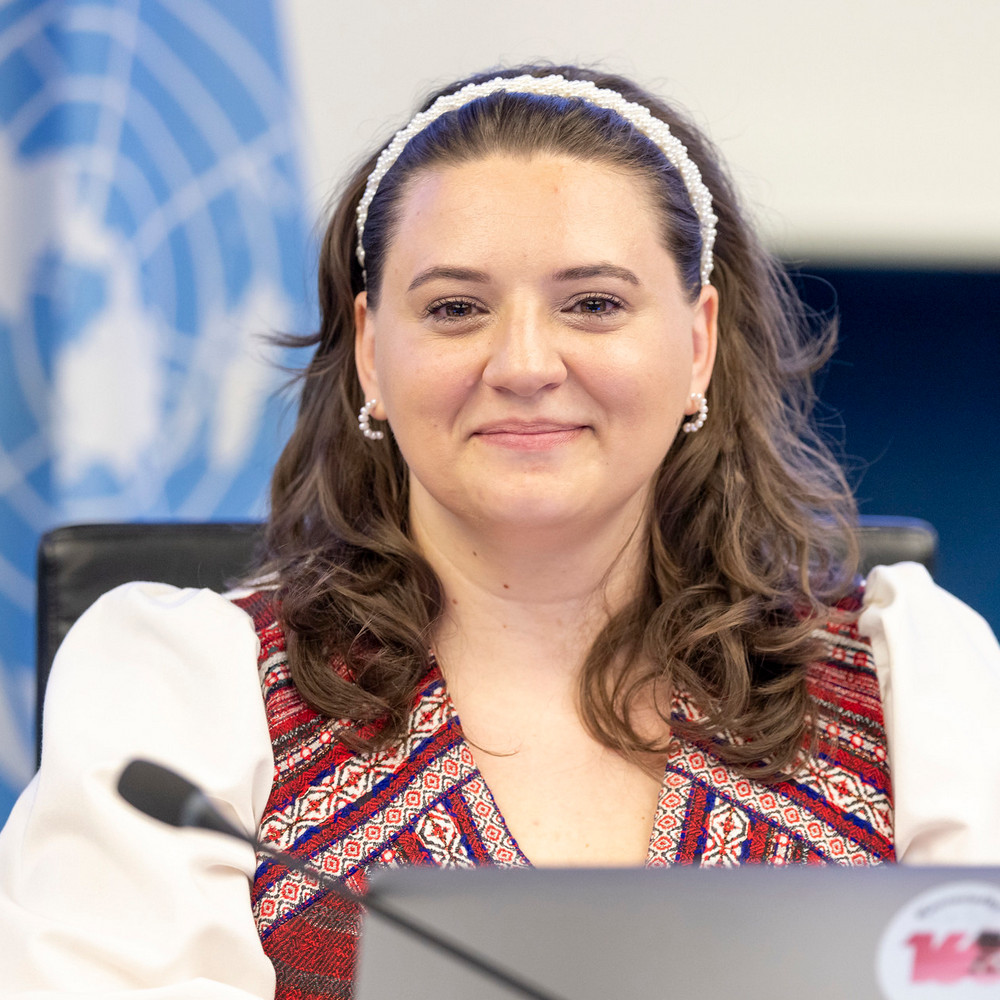 Cristiana Flutur, ITU Council 2025 Chair
Cristiana Flutur, ITU Council 2025 Chair
Child online protection
Over the past year, the ITU Telecommunication Development Bureau (BDT) has showcased the results of its global Child Online Protection programme, continued engaging with tech companies, and highlighted the work of ITU members and partners to strengthen online safety. This key BDT-led initiative promotes dialogue and knowledge-sharing, shares best practices, facilitates collaboration, and ensures children’s voices are heard at every stage. Councillors, underlining the need to keep children safe online, stressed the importance of verifying responsible behaviour when designing new technologies. BDT urged Member States to translate into local languages and deploy Child Online Guidelines.
Youth engagement and initiatives
Youth engagement at ITU has become increasingly meaningful, affirmed a report to Council by the Secretary-General. Activities based on Resolution 198 (Rev. Bucharest, 2022) have served to empower young people within ITU, as well as driving meaningful youth engagement and advocacy on digital issues worldwide.
Across the organization, numerous activities are being implemented to promote youth engagement, both at headquarters level and in regions worldwide. These include the ITU Secretary-General’s Youth Advisory Board, Generation Connect Youth Envoys, the Generation Connect Young Leadership Programme (GCYLP), the Global Youth Summit, the Robotics for Good Youth challenge, the UN Citiverse Challenge and the AI for Good Youth Zone.
Internal examples include the launch of the ITU Young Professionals Programme, increased recruitment of junior professional officers, strong engagement with the Youth Task Force, and a highly active internship programme.
The Council highlighted the importance of ITU’s engagement with youth, welcoming progress on youth inclusion and the recent establishment of the ITU Youth and Gender office.
Boosting submarine cable resilience
Nigeria’s Minister of Communications, Innovation and Digital Economy, Dr. Bosun Tijani, Vice Chair of ITU Council 2025, provided an update on the International Advisory Body for Submarine Cable Resilience established by ITU and the International Cable Protection Committee (ICPC) in 2024 and the International Submarine Cable Resilience Summit hosted by Nigeria in Abuja on 26-27 February 2025.
Submarine telecommunications cables facilitate over 99% of international data exchange, enabling communication, commerce, governance, healthcare and education. The Advisory Body’s three working groups, with more than 160 expert members nominated by governments, industry, academia, and international organizations, are set to produce best practices, case studies and other deliverables to aimed at enhancing the resilience of submarine cable infrastructure worldwide. The Council took note of the update from Nigeria.
Operational plans for 2026-2029
The ITU Council approved a four-year rolling operational plan for 2026-2029 based on five thematic priorities:
- Spectrum and satellite orbits
- International numbering resources
- Infrastructure and services
- Applications
- The enabling environment for digital connectivity and technologies
With 43 distinct outputs, the rolling plan follows the structure of the 2024-2027 strategic and financial plans approved by the ITU Plenipotentiary Conference in 2022. The current edition provides a detailed analysis for 2026 and a condensed one for the three subsequent years.
World Telecommunication and Information Society Day
ITU marked its 160th anniversary with an outdoor event on 17 May 2025, otherwise known as World Telecommunication and Information Society Day, or WTISD-25. The Geneva diplomatic and digital communities came together for a memorable light show projected onto the ITU Tower with the story of 160 years of technology for humanity. At the subsequent Council session, ITU members were invited to host the same light show in their respective countries to help lay the foundation for the next 160 years of shared contributions.
The Council also agreed on overarching themes for the next two annual editions, with the upcoming WTISD-26 set to highlight “Digital Lifelines: Strengthening Resilience in a Connected World” in the run-up to ITU’s next Plenipotentiary, while WTISD-27 will explore “Space for all: Expanding connectivity beyond borders” in the year of ITU’s next World Radiocommunication Conference.
Council 2025 by numbers
Physical & virtual participation:
Council delegates engaged actively in both formats:
518
physically
110
virtually
Global engagement:
All 48 Council Member States were represented on site, including:
370
physically
68
virtually
An additional 59 Council Observer Member States were represented, including:
129
physically
35
virtually
* The State of Palestine (ITU Res. 99) was also represented on site.
Women’s representation:
38%
on site
48%
virtual
Regulators & industry representatives:
5
Regional Telecommunication Organizations
6
nominated Sector Members
Multilingualism: AI powered interpretation
The Council noted the report by the Chair of the Council Working Group on Languages, which focused on the increased use of language service technologies and included an information document from the ITU Secretary-General on the challenges and opportunities of using AI-powered interpretation in ITU meetings. AI interpretation platforms continue improving rapidly, with market studies suggesting current challenges of live interpretation using AI can mostly be solved within two years. Even so, the ability of AI to communicate with high fidelity to original texts or statements remains uncertain.
AI provides undeniable speed and efficiency that could outweigh its disadvantages in certain scenarios. However, the nuanced understanding and verified accuracy of professional human interpreters remains essential for formal meetings for the near future. AI interpretation may be considered a suitable option for meetings with no human interpretation available, when time pressures impede recruitment, where specific languages are requested (other than ITU’s six official languages), or for general content that is neither sensitive nor technically complex.
Ensuring opportunities for girls and women
ITU’s gender equality and mainstreaming work, as requested by Resolution 70 of the Plenipotentiary Conference, focuses on targeted initiatives to address the persistent gender divide across the global tech sector and ensure institutional gender mainstreaming. The organization tracks gender data on digital access and usage, promotes Girls in ICT Day celebrations globally, and in March 2025 joined partners in unveiling EQUALS 2.0 – a renewed commitment to equip millions of women and girls with digital skills and opportunities by 2035.
Targeted initiatives like Her Digital Skills, HerCyberTracks, and the recently launched AI Skills Accelerator for Girls also leverage partnerships to create opportunities and improve the gender balance in global tech roles. The WSIS+20 High-Level Event features a Women Digital Ministers and Leaders session and program. The Network of Women (NoW) initiatives are active in each sector of ITU’s work.
Institutional gender mainstreaming initiatives consider women’s representation among staff and delegates, organizational culture, capacity assessment and development, gender-sensitive design and architecture, and allocation of financial resources. Updates on the implementation of the UN-SWAP (UN System-wide Action Plan on Gender Equality) and GEAP (Gender Equality Acceleration Plan) frameworks were also shared.
Councillors noted progress on gender issues over the past year, expressed the hope that more women would take part in future ITU conferences and meetings, and welcomed the recent establishment of the ITU Youth and Gender office.
Technical support to Palestine
The Council reviewed a status report by the ITU Secretary-General regarding ongoing assistance and support to Palestine. It acknowledged the extensive damage and challenges for continuous operation of telecommunications infrastructure and reaffirmed ITU’s commitment to supporting the Palestinian telecommunications sector in line with Council Resolution 1424.
The Secretary-General encouraged Member States to make voluntary contributions to ITU’s efforts in Palestine and to pledge support to the Palestinian telecommunications sector through the Partner2Connect initiative. A number of Council Members called for further strengthening of support to Palestine in this regard.
Technical support to Ukraine
Reporting on assistance and support to Ukraine, the ITU Secretary-General outlined activities and developments since the previous annual Council session. Support for rebuilding Ukraine’s telecommunication sector follows the modified ITU Council Resolution 1408, focused on monitoring and reporting, coordination mechanisms, technical assistance, mobilization of resources, and capacity-building activities.
The Secretary-General encouraged Member States and partners to pledge commitments and financial resources via Partner2Connect or provide voluntary contributions to help ITU fulfil the Council resolution. The Council noted the Secretary-General’s report.
Council Working Groups and Expert Groups
The ITU Council confirmed the dates and planned durations of its sessions in 2026 and 2027, along with the proposed dates for clusters of Council Working Groups and Expert Groups over the same period. Looking further ahead to 2028, the current Council proposed a first cluster over nine days between 11 and 21 January, a Council session between 13 and 23 June, and a second cluster over nine days between 12 and 22 September 2028.
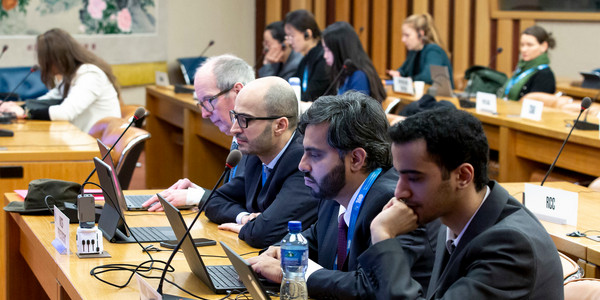
Physical and virtual meetings
The ITU Council noted new guidelines on the management of fully virtual meetings and physical meetings with remote participation. ITU meeting sessions currently fall into four categories: physical; fully virtual; physical with remote participation (intervention); and physical with webcasting.
Council 2025 at a glance
- Webcasts and captioning (ITU Member States and Sector Members only)
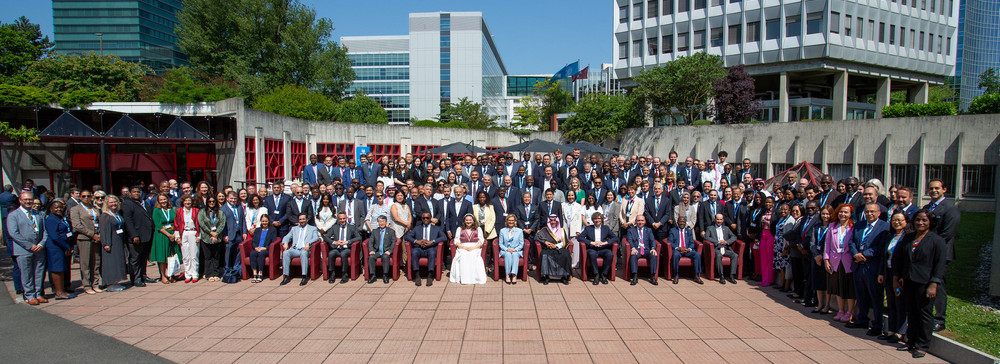
Media
Ms Doreen Bogdan‑Martin,
ITU Secretary-General
Subscribe to the ITU Newsletter
Get the latest on global trends in radiocommunication, technology standardization and digital development delivered to your inbox.

